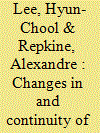|
|
|
Sort Order |
|
|
|
Items / Page
|
|
|
|
|
|
|
| Srl | Item |
| 1 |
ID:
172692


|
|
|
|
|
| Summary/Abstract |
We use spatial econometrics on a unique data set covering 229 Korean regions to analyze the outcome of Korea’s 2017 presidential election. We see strong statistical evidence of spatial correlation, suggesting that neighboring regions vote similarly, which is in accord with findings in the international context. Our findings are distinct in that we see little evidence that Korea’s 2017 outcome was driven by the economic disparities between the southeast and the southwest, a highly sensitive political issue in the country. Voters’ region of origin and age are the two most important factors in vote choice, irrespective of the socioeconomic and demographic characteristics of their regions.
|
|
|
|
|
|
|
|
|
|
|
|
|
|
|
|
| 2 |
ID:
090094


|
|
|
|
|
| Publication |
2009.
|
| Summary/Abstract |
North Korea is a socialist "dynasty" shrouded in secrecy. The regime's inconsistencies leave even the best of North Korean specialists and commentators befuddled as the country's actions invalidate their predictions. One must, however, understand North Korea's sociopolitical ideology in order to appreciate its inconsistencies as a regime. This paper will discuss the impact of North Korea's ideology in historical and sociopolitical context, as well as show the depth of ideological penetration into every layer of its society. The Juche ideology that has characterized the regime is a peculiar combination of nationalism, Marxism, and Confucianism. Since Kim Il-Sung's death, however, and the succession to power of his son, Kim Jong-Il, North Korea's ideology has metamorphosed into a series of sub-ideologies. The purpose of this paper is to elaborate on the process by which North Korean ideology changed and the paradox between the rise in ideological rhetoric and the weakening legitimacy of the regime under Kim Jong-Il.
|
|
|
|
|
|
|
|
|
|
|
|
|
|
|
|
| 3 |
ID:
120963


|
|
|
|
|
| Publication |
2013.
|
| Summary/Abstract |
Using unique survey data collected in 2000 and 2010 and a novel approach to the study of women's movement, this study examines the extent to which the women's movement has persisted and/or changed over the past decade in South Korea. The core emphasis of the paper is on whether Korean women's organizations have changed mobilization repertoires that are important for movement formation, and if so, how and why. The findings indicate two things. First, on one hand, the women's organizations have displayed similar patterns of resource mobilization (i.e., financial situation) over a ten-year period. On the other hand, women have used or have been willing to use different political tactics and alliance strategies to pursue their goals. Second, the younger women's groups, compared to their older counterparts, have collaborated more among themselves and have also been more satisfied with other public and private sectors in addressing women's issues and formulating appropriate policies.
|
|
|
|
|
|
|
|
|
|
|
|
|
|
|
|
|
|
|
|
|